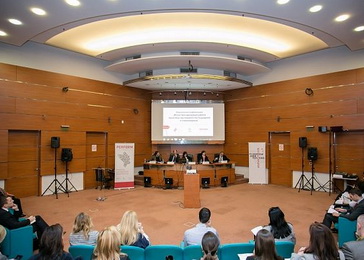 Policy makers are dealing with a large number of complex policy issues, while capacities in policy institutions are low with limited access to actual evidence. Only 8% of government employees have the capacity to work analytically (source: World Bank). Evidence, however, is crucial for good quality policy documents. Research institutions have the potential to provide quality evidence, but the cooperation between public institutions and social science research community is poorly developed.
Policy makers are dealing with a large number of complex policy issues, while capacities in policy institutions are low with limited access to actual evidence. Only 8% of government employees have the capacity to work analytically (source: World Bank). Evidence, however, is crucial for good quality policy documents. Research institutions have the potential to provide quality evidence, but the cooperation between public institutions and social science research community is poorly developed.
These were some of the issues discussed at the conference “Experiences with Evidence-Informed Policy Making in Serbia”, reviewing the pilots on collaboration between policy makers and researchers that were initiated and facilitated by the Public Policy Secretariat and PERFORM.
Through an open discussion, panellists and the audience addressed issues such as methods of funding this collaboration in future, and which incentives for scientists would be helpful to facilitate better cooperation. The role of different stakeholders, such as the Public Policy Secretariat (PPS) and the Ministry of Education, Science and Technological Development (MoESTD) was discussed as well.
Pilot Projects
PERFORM supported the Public Policy Secretariat in implementing four pilot projects, in which social science researchers and policy makers collaborated on complex policy issues. One of these was an analysis of the conditions in which young entrepreneurs do business in Serbia conducted by the Economics Institute for the Ministry of Youth and Sport. The study pointed to the lack of a supportive environment, lack of entrepreneurial knowledge and skills, underdeveloped financial support, and high tax burden. It proposed concrete measures for overcoming them, such as introducing a regulatory framework for venture capital investments, passing the Law on Microfinancing, tax incentives, and amendments to the Law on Foreign Exchange Transactions that would enable using PayPal for both effecting and receiving payments in foreign currency.
Participants of the collaborative pilots stressed that both sides benefitted significantly. Sanja Filipovic from the Economics Institute said that researchers highly appreciated that their research could meaningfully contribute to important policy issues. Jelena Grahovac, Senior Advisor at the Commission for Protection of Competition said that the pilots helped the Commission to understand the benefits of evidence-informed policy making (EIPM), that it increases the chances of policies responding to the actual situation on the ground. Ms Grahovac also stressed that applying the EIPM concept requires cooperation among different departments and hierarchical levels within institutions, as well as among different institutions.
“Facilitation of the collaboration between social science research institutes and the Government is still needed, since there is no institutionalised connection between them”, noted Jasna Atanasijevic, Acting Director of PPS.
Recommendations
Ivana Cirkovic, Assistant Minister in the Ministry of Public Administration and Local Self-Government, pointed out that the categories of policy-making, budgeting, and policy analysis need to be included in the Law on the Planning System. Ivan Sekulovic, SIPRU Manager, recommended providing more substantial support to the Human Resource Management Service in order to raise the capacities of government employees for policy analysis and development.
“The Ministry needs to encourage more policy relevant research projects, financed through the Ministry’s budget, as well as through the budgets of line ministries”, stressed State Secretary for Science of the Ministry of Education, Science and Technological Development, Prof. Vladimir Popovic.
Adopting Good Practices
PERFORM and the Secretariat developed and applied methodologies that improve the quality of research results. These include a clear identification of policy issues, research questions, research methodology and finally the development of policy options.
The challenge now is to embed these good practices into the system of administration and policy making. To that end, the Public Policy Secretariat is developing “Guidelines for Collaboration between Social Science Research Institutions and Policy Making Institutions” that will contribute to strengthening the linkages between social science research community and policymakers.
Source: www.perform.network
 Government of the Republic of Serbia
Government of the Republic of Serbia















 pdf [271 KB]
pdf [271 KB]
Leave a Comment